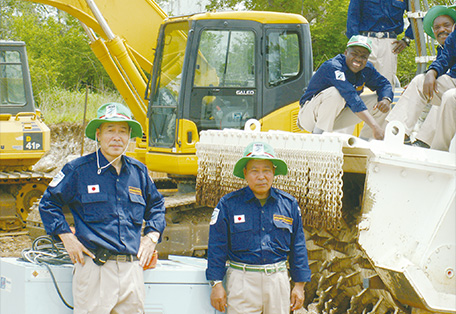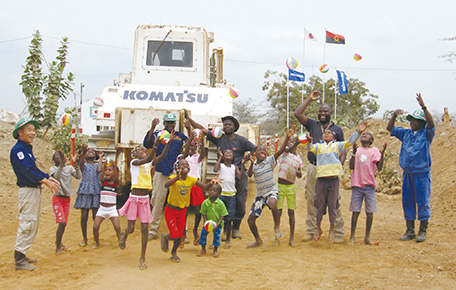Japan's Official Development Assistance White Paper 2013
Stories from the field 12
Fostering a Spirit of Self-reliance through Demining
–Activities of Japan Mine Action Service (JMAS) in Angola –

Mr. Doi (left) with a bulldozer, excavator, and mine removal machine after a once-a-week maintenance. (Photo: Yoshinao Doi)
The southwestern African country of Angola suffered 27 years of civil war, finally resolving in a peace agreement in 2002. These years of strife turned it into a country of landmines, leaving it with somewhere between 6 million to 10 million pieces of the deadly ordnance, an amount equivalent to approximately half the total population. The Government of Angola has set up the National Institute for Demining (INAD) to act as the implementing agency for the removal of these mines. The Institute uses demining machines, and needs to train their staff members to operate and maintain those machines.
In June 2008, a Japanese NGO, Japan Mine Action Service (JMAS) began activities in the town of Mabubas within the province of Bengo approximately 70 km away from the capital city of Luanda. Many mines are buried around the town due to its history as the location of an army garrison and warehouse. In 2007, two children were killed by mines. Here, JMAS trains 12 INAD personnel to undertake reconstruction focused on the safety and security of the land. The founder of JMAS, Mr. Yoshinao Doi, has been working in the region since the project began, and has instilled in the personnel a passion towards education. “Most of the international NGOs that work on demining carry out the work themselves. They don’t transfer the techniques to the locals. But in here, our work is meaningless unless we can support the Angolans to become self-reliant.”
Mr. Doi served as a member of the Japan Ground Self-Defense Force (JGSDF) for 35 years before retiring in 1999. Sometime after that, a former colleague who was at that time working as a JICA expert for demining in Cambodia requested that he set up an NGO specialized in mine removal. In the beginning, Mr. Doi intended to decline. But then he visited Cambodia, and while there he came to know just how many victims of unexploded ordnances (UXOs) there were. Mr. Doi specialized in UXO disposal during his days in the JGSDF, even serving as commandant of the JGSDF Ordnance-School. He came to believe that this was a problem that only he could address, and that he would regret it if he let this opportunity to act pass him by. He made up his mind to get involved. JMAS was established in September 2001, and since then it has expanded its scope of activities to Cambodia, Laos, Afghanistan, and Angola.
Mr. Doi describes his activities in Angola as “a fight against culture,” pointing out, “Even if we begin a training program, the INAD members show up late and take a day off frequently. People are allowed to take time off if they say they contracted malaria, and since people have a lot of relatives, there are funerals going on throughout the year. Morning meetings stretch on forever. Just improving this culture took three years.”
JMAS has an arrangement with INAD to pay subsidies to the INAD personnel every month. Mr. Doi refuses to transfer the funds through bank payments, instead handing out cash to each personnel member directly. This creates an opportunity for him to give a strict evaluation of the attitudes towards work and demining competency of each worker in order to reform their mindsets.
This project is receiving support from public and private partners across Japan, including the provision of demining machines from Komatsu Ltd. transport vehicles from Toyota Tsusho Corporation, and an office from Sumitomo Corporation.
Over time, the project has developed into a regional reconstruction support program. In addition to build infrastructure in the region, efforts are also being made towards children’s education. For instance, littering used to be a daily problem in Mabubas until Mr. Doi called on the local children and started a cleanup program. Relations with children have been further deepened by the program through holding football workshops and painting classes, and activities that have created flower gardens together with the children.
“The civil war in Angola spread to all corners of the country. Villages were split between pro- and anti-government forces. There are many adults here with their nerves on edge who still cannot trust other people. But the children are different. The next generation holds a lot of potential for this country.”
It has been five years since this project got into full swing, and the INAD personnel have grown throughout that time period. Demining operations have completed the initial 100 hectares since the start of the operation, and the project is now busy at work for the next 100 hectares. The comprehensive regional reconstruction programs, including its work to develop infrastructure and support agriculture after demining has finished, have been highly evaluated by the Government of Angola, such that it is decided that some important sections of the provincial capital shall now be moved to this region. Thanks to the work of JMAS, support of Japanese ODA, and the Angolans themselves, construction has now started on new towns in regions where security can be guaranteed.

Children express their joy at the gift of paper balloons received from staff from Komatsu Ltd. staff who came to inspect a mine removal machine. (Photo: Yoshinao Doi)
